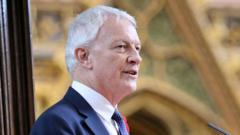New Zealand has officially relieved its High Commissioner to the United Kingdom, Phil Goff, from his duties following comments perceived as critical of U.S. President Donald Trump's understanding of historical precedents. Goff's statements, made during a London event, drew parallels between the ongoing conflict between Russia and Ukraine and the infamous 1938 Munich Agreement, which saw the ceding of territories to Adolf Hitler in a bid to avoid war.
In his remarks, Goff highlighted Sir Winston Churchill's condemnation of the Munich Agreement and questioned whether Trump, who had restored a bust of Churchill in the Oval Office, truly comprehended the lessons of history. His comment was made in the context of Trump’s recent move to pause military support to Ukraine amid tensions with Ukrainian President Volodymyr Zelensky.
Foreign Minister Winston Peters labeled Goff's remarks as "deeply disappointing," asserting they rendered his position "untenable." Peters emphasized that individuals in such diplomatic roles must align with the government's policies, stating it's essential to uphold the diplomatic face of New Zealand at all times. He defended his decision to fire Goff without prior consultation with Prime Minister Christopher Luxon, asserting he acted in what he deemed the government's best interest.
Despite Peters' rationale, Goff—an established politician with a history of public service, including his tenure as Auckland's mayor—has received support from critics like former Prime Minister Helen Clark. She argued that Goff's assessment drew valid contemporary parallels, suggesting that Peters' response was excessive and lacking a substantive basis.
The Munich Agreement, which permitted Hitler to annex parts of Czechoslovakia, is widely regarded as a grave misstep that failed to prevent the escalation leading to World War II. As international discussions on Ukraine continue, the significance of historical lessons in the realm of diplomacy remains critically relevant.
In his remarks, Goff highlighted Sir Winston Churchill's condemnation of the Munich Agreement and questioned whether Trump, who had restored a bust of Churchill in the Oval Office, truly comprehended the lessons of history. His comment was made in the context of Trump’s recent move to pause military support to Ukraine amid tensions with Ukrainian President Volodymyr Zelensky.
Foreign Minister Winston Peters labeled Goff's remarks as "deeply disappointing," asserting they rendered his position "untenable." Peters emphasized that individuals in such diplomatic roles must align with the government's policies, stating it's essential to uphold the diplomatic face of New Zealand at all times. He defended his decision to fire Goff without prior consultation with Prime Minister Christopher Luxon, asserting he acted in what he deemed the government's best interest.
Despite Peters' rationale, Goff—an established politician with a history of public service, including his tenure as Auckland's mayor—has received support from critics like former Prime Minister Helen Clark. She argued that Goff's assessment drew valid contemporary parallels, suggesting that Peters' response was excessive and lacking a substantive basis.
The Munich Agreement, which permitted Hitler to annex parts of Czechoslovakia, is widely regarded as a grave misstep that failed to prevent the escalation leading to World War II. As international discussions on Ukraine continue, the significance of historical lessons in the realm of diplomacy remains critically relevant.














